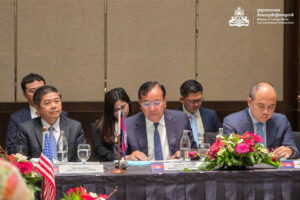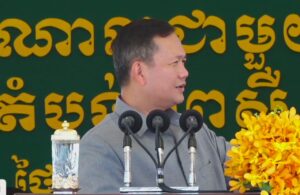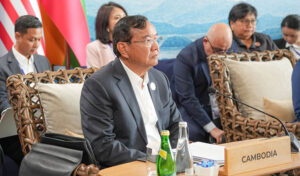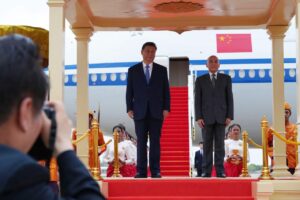Selected Comments Samdech Moha Bovor Thipadei Hun Manet, during the inspecting visit on progress of the Phase-I 4F-class Techo Takhmao International Airport (TIA) construction project
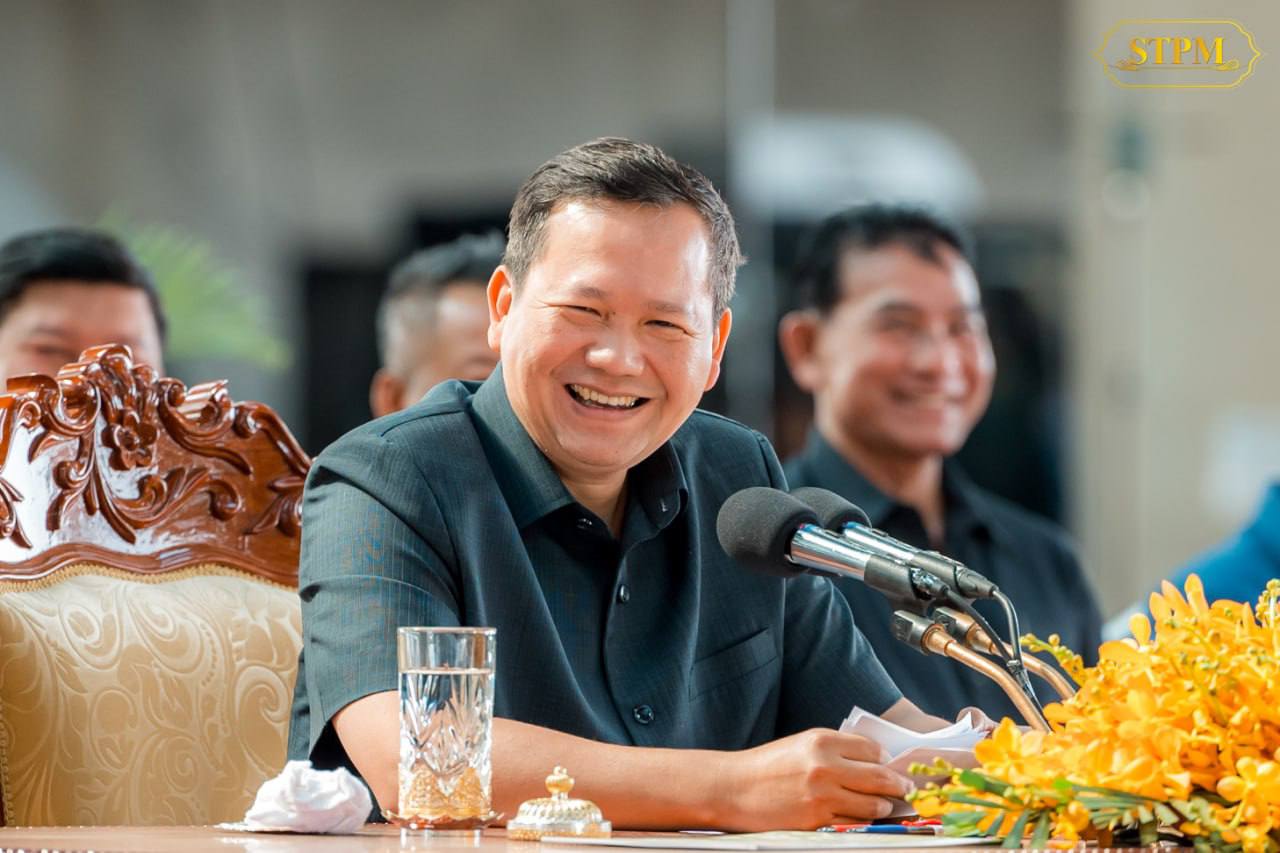 Selected Comments Samdech Moha Bovor Thipadei Hun Manet, during the inspecting visit on progress of the Phase-I 4F-class Techo Takhmao International Airport (TIA) construction project
Selected Comments Samdech Moha Bovor Thipadei Hun Manet, during the inspecting visit on progress of the Phase-I 4F-class Techo Takhmao International Airport (TIA) construction project
Selected Comments Samdech Moha Bovor Thipadei Hun Manet,
during the inspecting visit on progress of the Phase-I 4F-class Techo Takhmao International Airport (TIA) construction project
[Unofficial Translations]
(1) 4F-class airport built 65 years after the first 4D-class in Cambodia
I am pleased to meet with you all and oversee the progress of the 4F-class International Airport construction project […] once I got to the runway, although not yet finished, I feel so excited […] the day before, I inaugurated the International Airport in Siem Reap province, where I was thrilled once, […] historically, 65 years ago, we first built the Pochentong International Airport in 1954 […] (as this airport), which will be the largest airport in Cambodia, will be put into operation next year, our people here are not only witnesses but also builders of this historic achievements […]
[…] Having seen the evolution (of the airport developments, I must say it has become) a national pride. (Whether they be) big or small, they are what we can do/build. We have started from (the only) 4D-class Pochentong Airport to this 4F-class (Techo Takhmao International) Airport (TIA) […] (despite the disruption caused by) Covid-19, the project is still keeping momentum […] the construction continues to provide oxygen to the economy, especially tourism, which was somewhat disrupted by the Covid-19, so that the construction continues to have non-stop stimulation […]
(2) Local and foreign investors invited to expand investment capital of TIA
I am calling on other investors, both domestic and foreign, (to participate) in increasing investment capital or in buying bond. It means they will become owners, not shareholders, […] instead of leaving the money for interest in banks, let us put it here so we can continue (developing such an historic project) together […] my congratulations and appreciations go to the Secretariat of State for Civil Aviation for promoting and supporting the work of the entire air transport sector, not just the airport development […]
(3) Negotiating more direct flights as passengers increase
During the visit to Australia, we signed an agreement to open the gateway for air communications in the future […] when the number of passengers increases, we may open (for direct flights) […] we have just opened negotiations for direct flights with India. We will also expand more direct flights ports, even with countries we already have ones. With Indonesia, Thailand, and the Philippines, we negotiated to open other direct flights. The other day, with Malaysia, in addition to the existing direct flight between KL and Phnom Penh, we are figuring out possibility to open direct flight from KL to Siem Reap, and from other Malaysia’s tourist areas to Phnom Penh […]
(4) TIA and other infrastructure are for the development of the southwest and throughout the country
The TIA airport is not just for the development in Kandal province. The TIA airport is part of Samdech Techo’s strategy, along with other infrastructures, to promote development of the southwestern area of Cambodia, which includes Kandal, Takeo, Kep and Kampot provinces together. We are not doing it just to have attention. The location selection and planning are clear strategies that Samdech Techo has prepared so that this large airport is an additional driver for the benefit of (provinces) in the southwest as well as other parts of the country […]
There were three architectural design options to choose from in the beginning. Some projects (costs) three times cheaper than this project (that we have chosen), but Samdech Techo chose this expensive (project option) because we have to ensure that it will be serviceable from 50 to 100 years. It is a (historical) site […] I have noticed the efforts made specially by everyone concerned, including consultants, and by the British, Danish, South Korean, Chinese, and Cambodian companies combined. We have clear quality control […] and engineering responsibilities […]
(5) Investments that will benefit the whole country for decades to come
Whether you are just workers in some of these construction projects, please be proud that you are involved in building historical achievements that will serve not only the purpose of having (major airports), but will benefit our people a lot. Investing in this project will pay off across the country and for decades to come […] (the fact that we can build) this new airport is because we have peace on this land. Were there no peace, not to mention building an airport (worth) 1,500 (million dollars), but even companies would not dare to invest, […] the fact that they dare to invest in this mega infrastructure project is because they have a long-term thinking that Cambodia is a stable and peaceful country for decades to come […]
(6) Airport symbolizes major economic driver and job creation
TIA has been carved for two main objectives for large aircraft of all kinds and an active living movement. The airport in Phnom Penh used to receive 5,400,000 million passengers a year ago, before Covid-19. I think that TIA (will receive) no less (number of passengers) than that. As a plan, we are ready to receive 50 million people, whereas in the first year of operation, we should be ready to receive 13 million passengers; […]
Secondly, TIA symbolizes economic growth (in a country) from where people fled due to war to to-where tourists come. We renovated and expanded the old airports in Phnom Penh and Siem Reap. In Sihanoukville we use the old airport but, in the future, we will expand the runway to allow landing and taking off (of larger aircrafts) […] this year we are striving tourism in Siem Reap and investment in Sihanoukville […] where these three poles are connected by air […]
The fact that we are building an airport here is not only a tangible symbol of growth, but also a major driver of the economy that will create more jobs. The airport (construction project) has now 8,000 jobs left, while the construction activity was high, there were more than 15,000 people. Jobs here range from bottom to top, and our Cambodian engineers here are both working and learning skills, […] in the future, we can set up other logistics hubs that can greatly boost the surrounding economy. Definitely, the airport is a symbol of progress, not just for show […]
(7) TIA Supports Tourism and Transportation Growth
On the other hand (construction of TIA) supports the growth of tourism and transportation […] Cambodians living abroad have the opportunity to come visit the country and to connect across the country. Our economy is interconnected. We must work to draw them in. Inside, the country is connected. The airline attracts outside tourists to Phnom Penh, Sihanoukville, and Siem Reap, but it is also to allow foreign tourists to visit other tourist destinations in Battambang, Pailin, Samlot as well […]
Being able to attract tourists means we can create jobs and increase the income of our people. This is the chain of production. Our people should, together with the government, in the tourism sector should increase the number of products to attract more tourists […] we may have attracted a great number of tourists but if they do not stay long, do not travel around and visit places, (that would not be profitable too) […] the longer we can make them stay is the better […]
(8) TIA, Funan Techo Canal, and belt roads are the 3 potentials to promote the development of the Southwest Pole
[…] The Techo Takhmao International Airport (TIA) development location is favorable. If we look at the infrastructure investment plan that the government has built, we already have the third belt road, national road 2, and soon we are investing in the project of shipping lanes and logistics system that connects the river to the sea – the Funan Techo Canal, with which, in the region, there will be the three (infrastructures) on land, water and in the air, not far from each other, and with your calculation, you could see (the potential of these infrastructure projects) […]
Some have criticized the Funan Techo Canal a useless project, non-profitable to the people […] and besides, a Radio channel even quote “a senior official at the Ministry of Economy and Finance to have said that the Funan Techo Canal project was of no benefit to the Cambodians […] and Cambodia would money for the canal” […] if the person the radio quoted was truly from the Ministry of Economy and Finance, s/he were naive. This canal is not a project that we borrow (money to build). It is built as a BOT project, or the company borrows money to invest in the construction (and operate it for a set period of time) […] the state does not have to borrow any money […]
(9) Funan Techo Canal allows ferry of 3,000 tons; setting up of factories and jobs
The Funan Techo Canal allow ferry transportation up to 3,000 tons […] and some 1.6 million people living on either side of the 180 kilometers canal that connects the river to the sea […] when the canal is ready, it will bring potential to them. Companies/industries might consider setting up factories along […] and that will create jobs for our people around here.
Those of you who complete the construction jobs will be involved in other (economic activity) in/around the airport. You can transfer to other jobs or do something else since the economy (will be) created, and people in this province and other provinces may also come (to find works) here. It is for the development of Southwest (of the country), especially these four coastal provinces: Kep, Kampot, Sihanoukville and Koh Kong, whereas Sihanoukville will be set as the principal, with three other provinces bordering the sea connected to it. What about the province between the river and the sea? […] (Once) this canal is ready, they will serve as link between those at the salt water area and those at the fresh water area, or are provinces with more industrial potential […]
(10) Increase rice production two to three times in the next 10 years
We have (potential) agriculture […] compared to last year […] talking only about dry season, we have accomplished up to 170% of the plan. This year, we produced more than 11 million tons (of paddy rice). The domestic consumption will take five million tons. There will be more than six million tons left. We are planning to build various canal infrastructure with the estimate that in the next 10 years we can double the production by a factor of two or three. Therefore, the production will be increasing. With waterways or other routes in place, we can produce more and reduce the cost of transporting our agricultural products, leading to agro-industrialization […]
(11) The Benefits of Peace
Sometimes ago, I received the pageants from about 20-30 countries […] being asked what are the benefits of peace, I invited them to stand and walk around […] while returning to their seats, I told them that the fact that you are sitting on the 37th floor of an international modern air-conditioned building is in fact the fruit of peace. That you visited Siem Reap province and returned without worrying about shooting is a result of peace […] let TIA become a place that serve the flights and (provide) safety. Let (us keep the peace) […] what we are doing now is reaping the benefit from peace, taking the opportunity to promote the development and prosperity of our next generation, including children our people here too […]./.


